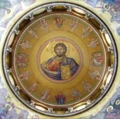Autocephaly
| Part of a series on |
| Eastern Christianity |
|---|
 |
Autocephaly (/[invalid input: 'icon']ˌɔːtəˈsɛfəli/; from Template:Lang-el, meaning self-headed), is the status of a hierarchical Christian church whose head bishop does not report to any higher-ranking bishop (used especially in Eastern Orthodox and Oriental Orthodox churches). When an ecumenical council or a high-ranking bishop, such as a patriarch or other primate, releases an ecclesiastical province from the authority of that bishop while the newly independent church remains in full communion with the hierarchy to which it then ceases to belong, the council or primate is granting autocephaly. For example, the Cypriot Orthodox Church was granted autocephaly by the Canon VIII Council of Ephesus[1] and is ruled by the Archbishop of Cyprus, who is not subject to any higher ecclesiastical authority, although his church remains in full communion with the other Eastern Orthodox churches. Similarly, the Georgian Orthodox Church was granted autocephaly (independent) in 466 by the Patriarchate of Antioch, the Tewahedo Church of Ethiopia was granted autocephaly by the Coptic pope in 1950, and the Orthodox Church in America was granted autocephaly by the Patriarch of Moscow in 1970. (The Greek Orthodox Church in North America is not autocephalous. It is subject to the Patriarch of Constantinople).
Autonomy
One step short of autocephaly is "autonomy". A church that is autonomous has its highest-ranking bishop, such as an archbishop or metropolitan, appointed by the patriarch of the mother church, but is self-governing in all other respects.
While autocephalous does mean self-governing, it literally means "self-headed". Kephale (κεφαλή) means "head" in Greek. Hence, autocephalous (αὐτοκέφαλος) denotes self-headed, or a head unto itself, while autonomous literally means "self-legislated", or a law unto itself. Nomos (νόμος) is the Greek for "law'.
Controversy
Over the last half century [i.e. until 1991] few subjects have provoked so much controversy in the Orthodox world as autocephaly. One need only mention the unedifying disputes between the Russian Orthodox Church and the Patriarchate of Constantinople concerning the status of the churches of Poland, Czechoslovakia and America. Disagreement has centered on the way in which autocephalous status is attained. To put matters in simplest terms, according to the Russian Church, any autocephalous church has the right to grant canonical independence to one of its parts. According to Constantinople, on the other hand, only an ecumenical council can definitively establish an autocephalous church, and any interim arrangements depend upon approbation by Constantinople, acting in its capacity as the mother church and first among equals.
— John Erickson, The Challenge Of Our Past[1], 1991
See also
- List of Orthodox Churches
- Eastern Orthodox Church organization
- Episcopal polity
- Byzantine response to Orthodox Church in America autocephaly
External links
- Autocephaly, an OrthodoxWiki article
- Autocephali Article in Catholic Encyclopedia
- Charles Wegener Sanderson, Autocephaly as a Function of Institutional Stability and Organizational Change in the Eastern Orthodox Church
References
- ^ Erickson, John (1991). The Challenge of our Past. Crestwood, NY: St. Vladimir's Seminary Press.
